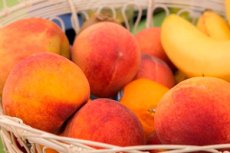Medical expert of the article
New publications
Peaches in type 1 and type 2 diabetes: can you or not?
Last reviewed: 04.07.2025

All iLive content is medically reviewed or fact checked to ensure as much factual accuracy as possible.
We have strict sourcing guidelines and only link to reputable media sites, academic research institutions and, whenever possible, medically peer reviewed studies. Note that the numbers in parentheses ([1], [2], etc.) are clickable links to these studies.
If you feel that any of our content is inaccurate, out-of-date, or otherwise questionable, please select it and press Ctrl + Enter.

Although diabetes imposes restrictions on many carbohydrate-rich foods, it is difficult to resist such temptation when summer comes and the shelves are bursting with juicy aromatic fruits. In addition, each person tries to restore and strengthen their health during the season of fresh vegetables and fruits, replenish the body's reserves of useful substances. Rarely will you meet people who would not like peaches. But can you eat them with diabetes?
Can you eat peaches if you have type 1 or type 2 diabetes?
It is important for diabetics to control their blood sugar levels. To do this, you need to know the glycemic index (GI) of the product you are consuming. It means how this level changes when you eat 100g of food with the same amount of glucose. Its source is carbohydrates, which are divided into fast and slow. The former are quickly absorbed and greatly increase sugar, the latter are absorbed into tissues gradually, without causing a sharp jump in glucose. The diet of diabetics should mainly include slow carbohydrates. What position do peaches occupy and can they be eaten with diabetes type 1 and 2? Analyzing the glycemic index of individual products, we see that buckwheat has an index of 50, semolina - 65, rice - 60, banana - 60, apricot -20, peach -30. It turns out that peach is not the most dangerous product for diabetes. But everything is individual and a consultation with an endocrinologist will clarify the issue. If the doctor does not impose a taboo on this fruit, then one a day without supplementing it with other sweet fruits is quite acceptable.
Peaches for gestational diabetes
This type of disease is typical for pregnant women. Hormonal changes inherent in the period of bearing a child sometimes lead to the body being unable to perceive its own insulin, and the pancreas cannot withstand the load. In most cases, after childbirth, everything returns to normal, but in order to avoid complications in the future, you need to eat right. Peaches for gestational diabetes, like apples, oranges, pears, are present in the menu of a pregnant woman. They are recommended to be eaten not as a main meal, but as snacks and in moderate quantities.
Benefits
Knowing the beneficial properties of peaches, no one would even think of giving them up. The fruit has a low energy value (39 kcal per 100 g of weight), so it is often used in weight loss diets. It contains a lot of β-carotene, ascorbic acid, vitamins K, B1, B2, B3, B5, E. Among the minerals, it contains the most potassium, less phosphorus, magnesium, manganese, calcium, fluorine. Peach pulp is rich in organic acids: citric, tartaric, malic, quinic; essential oils and pectins. This wealth is enough to improve the condition of the heart and blood vessels, digestion, organs of vision, improve metabolism, increase the body's resistance to infections and various diseases.
The varieties of common peach include:
- nectarine - it is also called a naked peach, because it does not have a fluffy shell. Its glycemic index is slightly higher than usual (35), but in its chemical composition it is in no way inferior to it and even superior. Its fiber cleanses the intestines of toxins and slags well, it has antioxidant properties, normalizes hormonal levels, strengthens the immune system, and promotes muscle growth. Nectarine can be consumed with type 2 diabetes, but in limited quantities, controlling bread units (100 g of fruit is equivalent to 1 XE);
- fig peach for diabetes - has a flattened shape, as if pressed in the middle, and its pulp is soft and juicy. This subspecies has all the previous characteristics. Treating yourself with one fruit a day with diabetes is quite possible.
Contraindications
Peaches are not recommended for people with obesity, allergies (especially fruits with velvety skin), and a tendency to nervous excitability. They are contraindicated on an empty stomach for people with increased stomach acidity, and in large quantities they can cause stomach upset.
 [ 3 ]
[ 3 ]
Prohibited fruits for diabetes
A high glycemic index is considered to be between 70 and 90. Fruits that are prohibited for diabetes include those whose GI is in this range. Let's list them:
Juices from any fruit will harm a diabetic, because the concentration of carbohydrates in them is higher than in fruits. Dried fruits should also not be consumed, but compotes from them are possible if they are pre-soaked overnight, then drained.
Reviews
Reviews from people with diabetes indicate that many allow themselves to indulge in tasty and aromatic fruits, but at the same time deprive themselves of other sugar-containing products. The main thing is to keep sugar under control with a glucometer.

